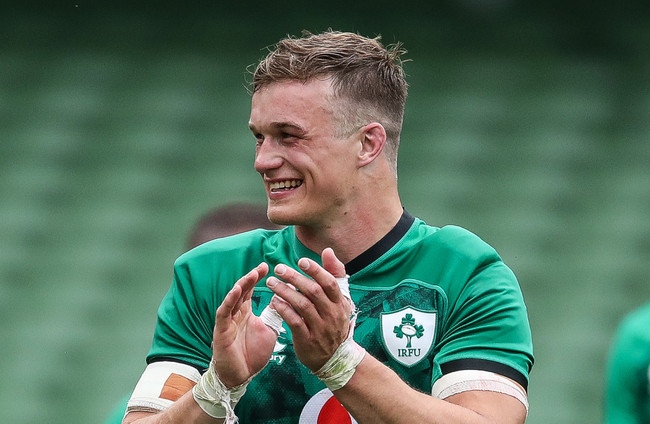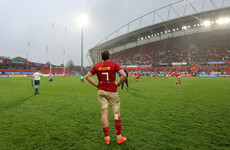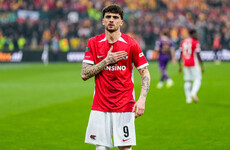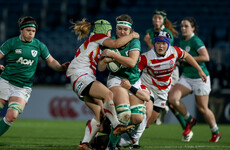A STORY FROM another age. Same traits, a different time. George Strong is Josh van der Flier’s grandfather. He too was a rugby man, intent on overcoming hardships.
In van der Flier’s case, the issue that used to be thrown at him was his size. His problem, he kept being told, was that he couldn’t carry. Grandfather George’s was that he could not drive.
That wouldn’t be such a big deal today. But back then it was. He lived in Waterford but the club George Strong wanted to play for was in Kilkenny. That’s an 84-mile round trip to training. George never flinched. “He used to cycle it, week after week,” van der Flier tells us.
That’s where the work ethic comes from. Darragh Fanning noticed it when he was on Leinster’s books. Way back then, ahead of the 2013/14 season, Fanning was signed so late that by the time he got into the changing room, he discovered the lockers were all assigned. “The only place you can change is with the academy lads,” Fanning was told.
So he did. That was the first he saw of van der Flier. Plenty around him were loud, cocky, believing they’d made it. Josh was different. “Quiet,” says Fanning. “But thoughtful. And seriously driven, seriously hard working.”
He didn’t lick it off the ground. George Strong, his maternal grandfather, picked up a couple of Towns Cup medals in the 1950s to justify those cycle journeys to Kilkenny. Later when his mother moved to Dublin and got married, George noted how his new son-in-law was just as devoted to rugby. Back when rugby was as much about pints as it was about points, van der Flier senior used to drink water when his team mates downed something stronger. “He knew that by not taking alcohol, he might have the edge over the other lad in training,” says van der Flier.
“I guess what I’m saying is (the work ethic), it is in the blood.”
The rugby world has seen it since 2016, the year he won the first of his 34 Ireland caps. Two things stood out, his red scrum cap, his tireless attitude.
Normally when newbies break through, people are full of praise, eager to point out all the things they do well. Then, when the novelty wears off, and someone younger has emerged, they hear about all the things they do poorly. For van der Flier, there were constant reminders that size matters.
He was strong, like grandfather Strong. But not strong enough. After the 2019 World Cup, he was one of the fall-guys. He went away, thought about what he had to do, and came back a different player. All of a sudden, he was getting across the gainline. From being an alleged weakness, carrying became a strength.
Tomorrow afternoon he will carry Ireland’s hopes on to the pitch at the Aviva Stadium. At 28, the summer of his career has arrived. As a kid who came through the Leinster academy, the players he looked up to — Sean O’Brien, Jamie Heaslip, Shane Jennings and Kevin McLaughlin — used to go through match videos with him and point out things he could do better.
Heaslip stays in touch, frequently mentoring him. “Same with Seán O’Brien. I wouldn’t say I’m very like Seán O’Brien in terms of personality and stuff but he’s someone I’d always look up to in terms of performance and everything, even thinking back to last year when selection wasn’t going my way. That was when he rang me up to see how I was getting on.
“That was one of the special things about rugby – I’ve certainly found it with the back row lads, and the lads in Leinster and Ireland, they always have your back. I’ve been very lucky to have had so many good role models.”
Lucky?
He hasn’t been.
This time four years ago he was in a similar position to now after Joe Schmidt selected him for the first game of the Six Nations. That day ended for Ireland with Johnny Sexton’s winning drop goal. It ended for van der Flier after just 35 minutes, his ACL torn, his game – and season – over.
Since then there has been plenty of other setbacks. This is his seventh Six Nations. He has won one in the sense that he received a medal for the 35 minutes he got on the Stade de France pitch in 2018. But did he feel part of it? “In fairness to Joe (Schmidt) and the coaching staff at the time, any of the lads who had been involved in the tournament were brought back at the end for the medal presentation. So that was nice. It would obviously have been nice to have been involved more – but even if I had been there for that entire tournament, I would still have the drive to do it again. To be able to win a trophy with your country would be incredible.”
The trouble is that four other teams have the same dream. Italy? Well, forget about them. They make up the numbers. But France, England and Scotland are genuine contenders while Wales are the team that just never go away, no matter what rubbish their regions are producing, no matter how indifferent their Novembers have been.
Van der Flier hasn’t failed to notice the difference between games for Leinster against Cardiff, Dragons, Scarlets or Ospreys, and games against the same players once they pull on a red jersey. It’s like a cape. Think of Sam Warburton for Cardiff and you won’t think of too many memorable moments. But think of him for Wales and there are loads of them.
Twice the Welsh have been to World Cup semi-finals in the last 11 years; twice they have won a grand slam in that period, with two further Six Nations victories also emboldened on their resume. “Once they put on that red jersey it is different game altogether with those fellas,” says van der Flier. “We know they are a good team.”
Perhaps so. But these days Ireland are a better one. You sense they’ll be the ones getting off to a flier tomorrow.













Last of the United greats
@John Harte: that header at stoke
@John Harte: A very likeable player.
Staying and scoring 40 goal’s is that before, during or after the tantrum ‘s?
On Fergie, no other Utd manager will get the same disproportionate financial advantage as Fergie had. He robbed Villa and Spurs of their best player’s. With all the money all PL club’s get that advantage has been eroded. Furthermore, the top 4 all get greater money in CL qualification than available 10 year’s ago. Therefore, if Utd can’t qualify the financial advantage they used to have gets eroded even further. The problem is the expectation of their fan’s versus the new reality.
@Daniel Kelly: you are talking absolutely bs, 1st regards taking villa/spurs best players jesus you would think utd absolutely drained them throughout the years, Sheringham, berbatov,Carrick,Yorke with villa, who else?? That’s in nearly 25yrs..To this day all the top clubs have and are still buying the best players from the lesser clubs it has always happened and yes champions lge money helps give your head a good wobble there its not as if fergie or utd created this..
@Pauly Kel: Just like Big Jack Charlton had the best crop of Irish player’s ever…. Fergie had a financial stranglehold on the PL with revenues exceeding all other club’s. He plundered the above plus West Ham, Leeds, Forrest, Wigan et al for their best player’s. My point stands Kane ain’t swapping Spurs now for old toilet! Thanks for listening……
He is still there!